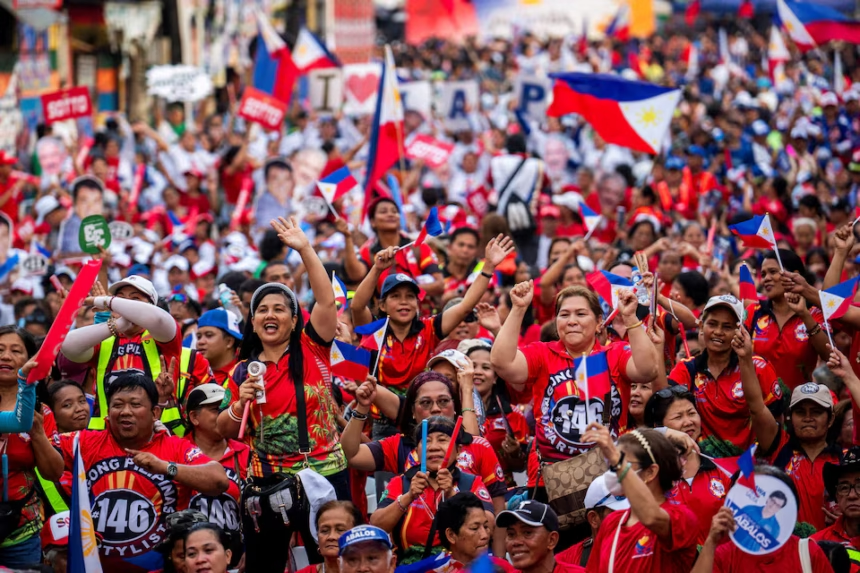MANILA – As voter cast their votes in the 2025 midterm elections in the Philippines, a contest once focused on local issues has been shaken up by the country’s tense dealings with China, especially around the South China Sea.
Along with changing ties with the United States and the public rift between the Marcos and Duterte camps, these factors have turned the race for 12 Senate seats, 317 congressional posts, and thousands of local positions into a pivotal contest that could affect the country’s direction both at home and abroad.
China’s push in the South China Sea, where it lays claim to areas inside the Philippines’ exclusive economic zone, has long been a sore spot. This year’s elections, however, have put the issue front and centre, rare in a country where local jobs and political connections usually guide voters.
President Ferdinand “Bongbong” Marcos Jr. has used the situation to brand himself as the country’s protector against China, creating a sharp divide with his predecessor, Rodrigo Duterte, who had taken a softer approach to Beijing.
Marcos hasn’t held back. At a rally in February, he pushed voters to ask themselves if they wanted to return to a time when leaders seemed willing to give in to China—a clear criticism of Duterte and his daughter, Vice President Sara Duterte.
This message has struck a chord as public distrust of China grows. An April 2025 survey by Social Weather Stations found 75% of Filipinos back candidates who stand up to China’s actions in the West Philippine Sea.
Incidents such as the June 2024 collision between a Philippine boat and the Chinese Coast Guard, which left a Filipino sailor hurt, have only raised anger. Marcos has responded by presenting his Senate slate as tough on maritime rights. While his government reached a temporary deal with Beijing last year to cool things down, this has been overshadowed by bold campaign speeches.

The Marcos-Duterte Split
A big story in this Philippine election is the collapse of the Marcos-Duterte “UniTeam,” the group that swept the 2022 contest. Personal and policy clashes have made the midterms a showdown over the country’s future. The divide is clear when it comes to their approaches to China and the United States.
Duterte’s presidency from 2016 to 2022 saw him side with Beijing, downplaying disputes in pursuit of business ties. His reported “gentleman’s agreement” with China, which Marcos has since criticised as secret and damaging, remains a flashpoint.
Sara Duterte now leads her father’s political network but has come under fire for not speaking up about China’s aggression. Some lawmakers have even accused her of betraying the country.
In contrast, Marcos has worked to rebuild ties with the United States. He has reopened defence deals and allowed more U.S. military use of Philippine bases, hoping to balance China’s influence.
While this approach is welcomed by some foreign governments, it risks turning off those wary of outside involvement, especially with Donald Trump back as U.S. president, which adds new doubts about America’s commitment.
Sara Duterte’s political future is at risk in the Philippines. The Marcos-backed House impeached her in February 2025, charging her with fund misuse and threatening the president. Her Senate trial is set for June.
The Senate election will decide who holds power in the chamber, which acts as the jury in her trial. If Marcos’ team wins big, Sara could lose her grip on power. But if the Dutertes hold enough seats, she could avoid conviction and keep her 2028 presidential hopes alive.
Philippines South China Sea Tensions
The South China Sea dispute remains a serious problem, with effects reaching beyond the campaign in the Philippines. China’s so-called nine-dash line crosses into the Philippines’ waters, leading to frequent clashes over fishing, oil, and military control.
The 2016 Hague tribunal ruling rejected China’s claims, but Duterte downplayed the decision while Marcos has championed it, making it a source of national pride.
Reports of Chinese efforts to sway the election, such as spreading fake news to support Duterte allies, have raised concerns. In April, a National Security Council official told senators that signs point to Beijing’s involvement, though there’s no clear proof yet.
Up to 45% of election chatter online comes from accounts suspected to be fake, some even using Chinese names, often trying to weaken Marcos’ stance on the sea dispute.
Marcos’ push to partner with the U.S., highlighted by the 2024 U.S.–Philippines Partnership Act, backed by Senator Marco Rubio, has led to stronger military links. Still, Trump’s focus on looking inward has cast doubt on whether Washington will continue to support its allies in Asia. If the U.S. steps back, the Philippines may face China’s pressure alone, a possibility that Duterte’s team uses to argue for independence from outside help.
This midterm isn’t just about policies; it’s about where loyalties lie and who voters trust. Marcos’ picks, which include well-known figures like Manny Pacquiao, are likely to win most Senate seats, showing strong support for his tough stance on China.
Yet Sara Duterte’s popularity remains high—she currently enjoys a 59% approval rating in the Philippines, well ahead of Marcos’ 25%, especially in Mindanao, a Duterte stronghold.
Rising prices and economic troubles—like 10% inflation over three years—could limit Marcos’ success. Some may use their vote to show frustration with the cost of living and leadership. However, the power of political families means few real alternatives for many voters.
These elections will shape the lead-up to the 2028 presidential race, with Sara Duterte still a major player despite her legal troubles.
A win for Marcos could solidify a strong anti-China, pro-U.S. approach, while a Duterte comeback might mean a return to friendlier ties with Beijing. As misinformation spreads and regional tensions stay high, the results will matter not just for the Philippines but for all of Southeast Asia.















